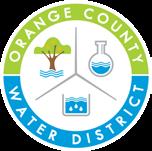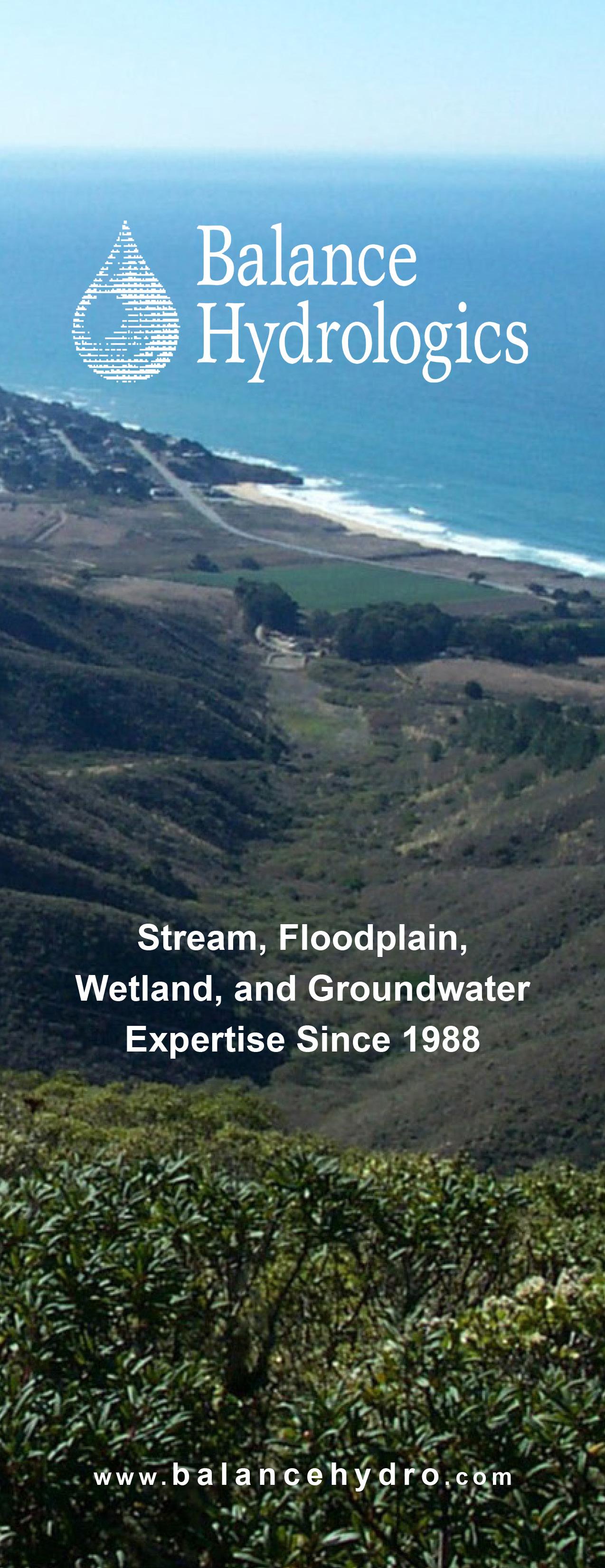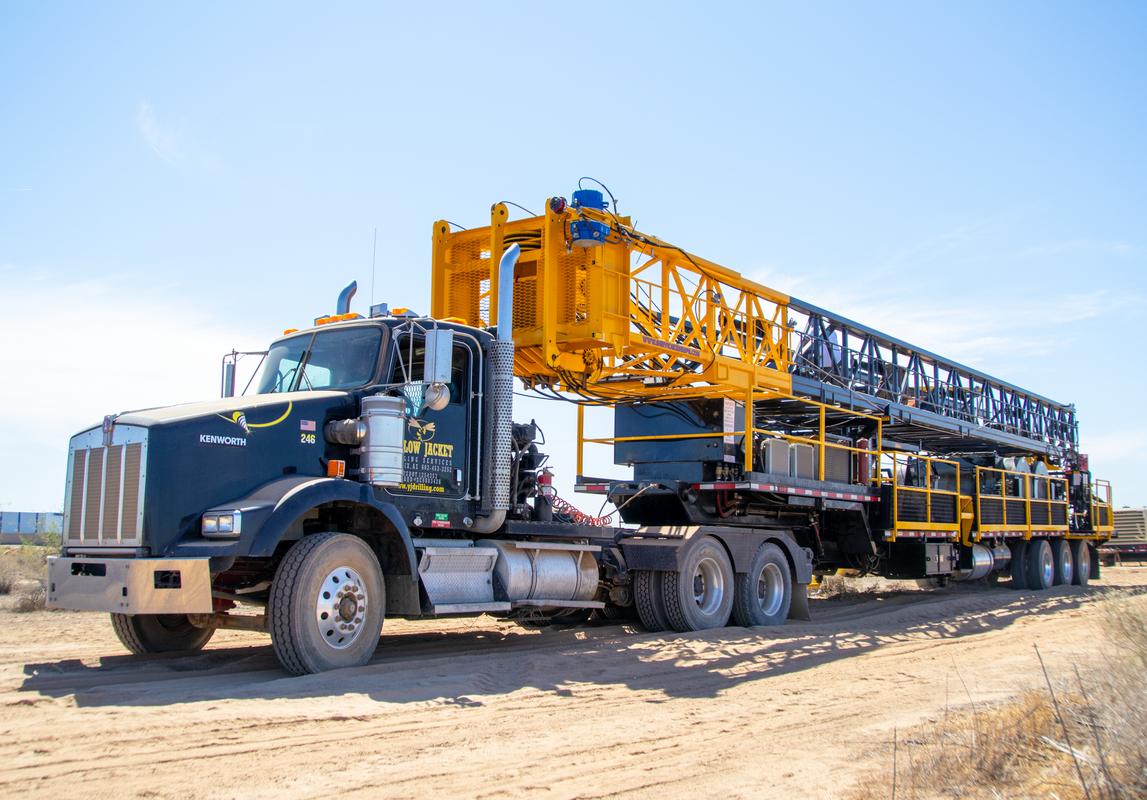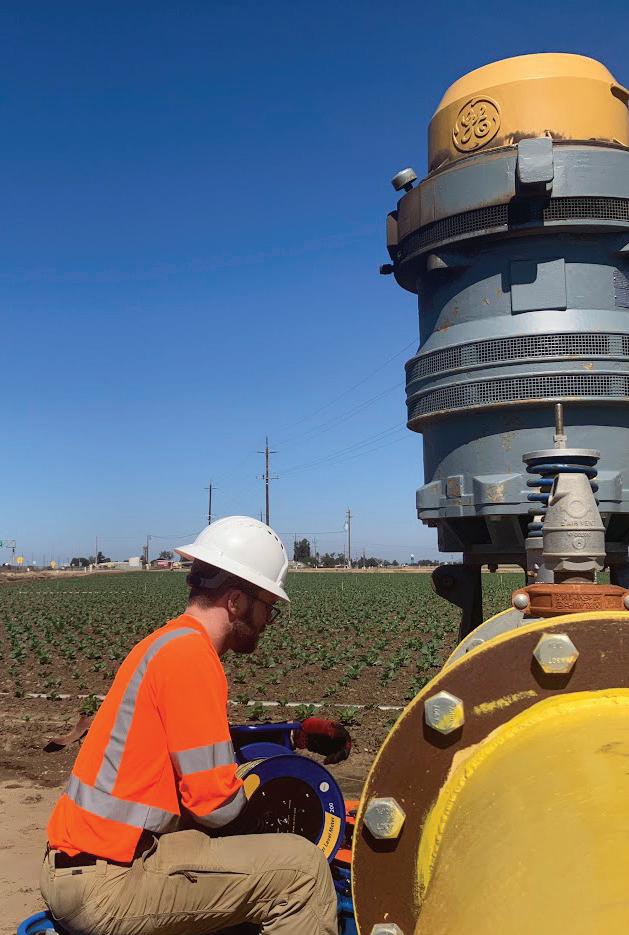AGENDA
Thank you to our Diamond Jubilee Sponsor



Thank you to our Diamond Jubilee Sponsor






















The Groundwater Resources Association of California (GRA) is excited to invite you to join us as a sponsor of the eighth annual Western Groundwater Congress (WGC) to be held October 6-9, 2025 at the San Diego Town and Country in San Diego, CA. The online sponsor registration closed September 5, 2025. Contact staff if you’re interested in sponsoring the event, but NOTE: Registrations received after this day may not be included in printed conference documents.
The Groundwater Resources Association of California (GRA) invites you to become an Annual Sponsor . Our annual sponsorship packages offer tailored opportunities to elevate your organization’s profile, engage with industry leaders, and support vital education and technical leadership in groundwater resources. Receive discounts for registrations, events sponsorships, complementary access and brand visibility through everything GRA does! By sponsoring GRA, you help advance our mission to protect and improve groundwater supply and quality, while positioning your organization as a committed leader in the industry.



Hello! And welcome to the Groundwater Resources Association of California’s (GRA) 8th Annual Western Groundwater Congress (WGC). As this year’s Chair, I’m honored to welcome you to San Diego.
This conference has always been about connection - bringing together the broader groundwater community to learn, grow, and face challenges together. We know that real collaboration doesn’t just happen during panels or breakout sessions; it’s built through the relationships we carry into our daily work. And that takes trust, time, and a shared commitment to something bigger than ourselves.
Our 2025 theme, “Join Team GRA,” is an invitation. It’s about showing up and recognizing that progress happens when we work across roles, sectors, and perspectives. Groundwater management is a team effort—one that requires technical skill, open-mindedness, and a healthy dose of creativity.
The WGC is more than just a conference; it’s a home base for this community. We’re scientists, modelers, policy thinkers, drillers, educators, geologists, engineers, regulators, and students. We work in agencies, government, academia, nonprofits, private firms, and local communities across the West. And for three days, we come together as one team - sharing ideas, challenging assumptions, and strengthening the relationships that shape the future of groundwater.
This year’s program is full of opportunities to do just that. We’ve introduced a new pre-conference workshop day, expanded student participation, and curated sessions designed to foster meaningful dialogue across disciplines and organizations. The agenda reflects the breadth of groundwater work in the Western U.S.—from technical innovation and data tools to on-the-ground implementation, policy, and community partnerships. Whether you’re here for deep technical sessions, cross-sector conversations, or to grow your professional network, we’re glad you’re here.
GRA is a volunteer-powered organization, and WGC reflects the care, insight, and generosity of everyone who stepped up to make it happen. Thank you for being part of this community and part of the evolving story of groundwater in the West.
We’re excited for the week ahead—and grateful to share it with you. Whether you’re presenting, learning, connecting, or simply taking it all in, we hope you leave energized and equipped for the work ahead. Because when it comes to sustainable groundwater management, we’re all on the same team!
Savannah Tjaden Chair, Western Groundwater Congress
Environmental
Science Associates
2025
Board Member, Groundwater Resources Association




MONDAY, OCTOBER 6TH
12:00 PM – 4:00 PM
Registration and Sponsor/Exhibitor Setup
1:30 PM – 4:30 PM
Preconference Sessions (Pre-registration Required)
TUESDAY, OCTOBER 7TH
7:00 AM – 5:30 PM
Registration
7:00 AM – 8:00 AM
Continental Breakfast
8:00 AM – 9:00 AM
Welcome and Keynote Session
9:15 AM – 9:30 AM
Break and Networking with Exhibitors
9:30 AM – 11:00 AM
Concurrent Sessions #1
11:00 AM – 11:30 AM
Break and Networking with Exhibitors
11:30 AM – 12:30 PM
Concurrent 60-Minute Sessions #2
12:30 PM – 2:00 PM
Networking Lunch
2:00 PM – 3:30 PM
Concurrent Sessions #3
3:30 PM – 4:00 PM
Break and Networking with Exhibitors
4:00 PM – 5:00 PM
SNAPP & Student Networking
5:00 PM – 7:00 PM
Welcome Reception
WEDNESDAY, OCTOBER 8TH
6:00 AM – 7:45 AM
Darcy Dash
7:00 AM – 5:30 PM
Registration
7:00 AM – 8:30 AM
Continental Breakfast
8:30 AM – 10:00 AM
Concurrent Sessions #4
10:00 AM – 10:30 AM
Break and Networking with Exhibitors
10:30 AM – 12:00 PM
Concurrent Sessions #5
12:00 PM – 1:30 PM
GRA Annual Meeting, Awards Ceremony, and Luncheon
1:30 PM – 3:00 PM
Concurrent Sessions #6
3:00 PM – 3:30 PM
Break and Networking with Exhibitors
3:30 PM – 4:30 PM
Concurrent 60-Minute Sessions #7
4:30 PM – 6:30 PM
Poster Sessions and Evening Reception
6:30 PM – 9:00 PM
Closing Reception and Silent Disco
THURSDAY, OCTOBER 9TH
7:30 AM – 10:00 AM
Registration
7:30 AM – 8:30 AM
Continental Breakfast
8:30 AM – 10:00 AM
Concurrent Sessions #8
10:00 AM – 10:30 AM
Break and Networking with Exhibitors
10:30 AM – 11:30
Concurrent 60-Minute Sessions #9
11:30 AM – 12:00 PM
Closing Remarks
MONDAY, OCTOBER 6TH
12:00 PM – 4:00 PM - Registration and Sponsor/Exhibitor Setup- PACIFIC FOYER
New this year, we are setting up a day early! Feel free to come by and grab your name badges the day before and skip the morning rush for the start of our conference!
1:30 PM – 4:30 PM - Preconference Sessions (Preregistration Required)
WORKSHOP 1: HARNESSING OPENET TO SUPPORT WATER CONSERVATION - PACIFIC C
Led by Sara Larsen (OpenET Inc. Non Profit) and Dr. A.J. Purdy (California State University, Monterey Bay)
This workshop explores how to use evapotranspiration (ET) data to support implementation of water conservation initiatives. The discussion and technical demonstrations will review a series of case studies and technical workflows based on OpenET data services that will guide participants through steps related to the establishment of historical use patterns, strategies for on-farm applications and participation, and estimation of the conserved consumptive use of water - variables that are critical elements of a successful demand management program.
WORKSHOP 2: SCALING RECHARGE TOGETHER: A HANDS-ON WORKSHOP TO SHAPE THE FUTURE OF FLOODMAR - PACIFIC D
Hosted by the FloodMAR Network, facilitated by Richael Young (Sustainable Conservation)
Join the FloodMAR Network for an interactive, station-based workshop designed to explore key elements of effective groundwater recharge. This pre-conference session will feature four themed stations, each hosted by subject-matter experts who will share emerging strategies, challenges, and questions—and invite your insights in return.
Participants will rotate between stations focused on:
1. Partnerships & Social License– What motivates landowners and other partners to participate in recharge, and how can we build long-term trust and shared benefits?
2. Technical Assistance & Tools – Explore decision-support tools and resources that help identify suitable recharge sites and support implementation.
3. Incentives & Funding Opportunities – Learn about incentives and funding resources that aim to encourage participation and lower implementation barriers.
4. Quantifying Recharge & Water Quality Considerations– Discuss approaches to quantifying recharge events and managing potential risks to groundwater quality.
Whether you’re a practitioner, policymaker, scientist, or community leader, your voice is essential. Help us shape the next chapter of recharge in California. For more information about the FloodMAR Network, please visit floodmar.org.

Hosted by the Groundwater Demand Management Network, facilitated by Dave Ceppos (David M. Ceppos Public Policy Mediation and Facilitation)
This interactive workshop will convene groundwater practitioners, policymakers and researchers to create a shared space for learning, connection, and problem-solving around groundwater demand management. Participants will engage on key technical and policy issues, and share lessons learned from designing and implementing demand-side programs. Hosted by the newly launched Groundwater Demand Management (GDM) Network, the session will including two panels and associated interactive discussion by attendees.
- Panel 1: GDM Network Executive Team – Key Work on Demand Management and Network Goals
- Panel 2: GDM Practitioners – Representatives from throughout the State discussing diverse GDM examples in their respective basins/subbasins.
The workshop will also include a summary and discussion of outcomes to-date on the recent GDM Network - Community Needs Assessment Survey to determine what the community of demand management professionals need from the Network. https://bit.ly/gdmn-survey
Together, participants will help strengthen a growing community of practice dedicated to advancing thoughtful and effective demand management solutions across California and beyond. For more information about the GDM Network, please visit https://gdmnetwork.org/.

A global water resources leader, working to partner with and support clients to advance integrated sustainable water management.

We don’t just understand municipal, local, and industrial water cycles — our experts partner with you to bring innovative solutions that meet today’s needs and anticipate tomorrow’s challenges
Our Groundwater Sustainability Services
• Geophysical surveys and interpretation
• Hydrogeologic conceptual models
• Groundwater flow models
• Managed aquifer recharge
• Water availability assessments
• Risk and resilience assessments
• Vulnerability assessments
• Water resources management
• Data compilation and quality screening
• Data collection and management
• Expert witness/litigation support
Let us know how we can help you meet your short- and long-term water needs!

TUESDAY OCTOBER 7TH
7:30 AM - Registration and Continental Breakfast - PACIFIC FOYER
8:00 AM - Welcome/Opening Keynote - PACIFIC A
Welcome to the 2025, 8th Annual Western Groundwater Congress! Come join us for our morning remarks and outstanding Keynote Session.
This year’s keynote takes a fresh approach featuring three short, TED-style talks that highlight how collaboration and community have powered some of the biggest groundwater wins of the year.
• From SGMA Ground Zero to SGMA Success Story Speaker: Anona Dutton, EKI
Story of alignment across agencies and stakeholders to move a basin forward.
• Working Together to Stop that Sinking Feeling: Collaborative Approaches to Addressing Subsidence Challenges in California Speaker: Abhishek Singh, INTERA
How technical expertise, feedback, and stakeholder engagement translated into new management strategies.
• From Dry Wells to Shared Solutions: Community-Centered Mitigation in Action Speaker: Tami McVay, Self Help
Examples of trust-building, community engagement, and responding to real needs of impacted residents.
Join us for this dynamic keynote session as these leaders share not just what was achieved, but how partnerships, persistence, and people made it possible.
9:15 AM – Break and Networking with Exhibitors - PACIFIC A
9:30 AM - Concurrent Sessions No. 1 | Choose A Track!
TRACK 1: GROUNDWATER MODELING TOOLS - PACIFIC C
Moderated By: Nigel Chen, EKI
• Bill Rice, Larry Walker Associates: Beyond Accuracy: The Economics of Running Big Groundwater Models
• Graham E. Fogg, University of California, Davis: Data-Driven Workflow for Building Reliable Groundwater Models
• Lan Liang, California Department of Water Resources: Modeling historical evapotranspiration and groundwater of the past half century in California Central Valley
• Raghu Suribhatla, Haley & Aldrich: Strategies for Development and Calibration of Numerical Groundwater Models from Environmental Sequence Stratigraphy



At LWA, we understand that groundwater is vital for California’s water future. We’re here to help communities manage this precious resource wisely and in line with state regulations.
Davis, CA | 530.753.6400
with regional offices in Berkeley, San Diego, San Luis Obispo, Santa Monica, Seattle, Ventura, and Yreka
Creating sustainable water supplies for the future requires reimagining the water cycle

TRACK 2: LATEST ON REMOTE SENSING OF ET - PACIFIC D
Moderated By: Dominick Amador, Woodard & Curran
• A.J. Purdy, PhD, California State University, Monterey Bay: Best practices for evaluating remotely sensed evapotranspiration data through comparison with eddy covariance, flowmeter and other water use data
• Daniel Smith, Davids Engineering: Flowmeters and Remote Sensing; How do the Methods Compare? (Co-Authors: Stephanie Anagnoson, Tukta Phetasa, Leticia Tapia, Jacinta Cabral, and Aleta Allen)
• Forrest Melton, NASA Ames Research Center: OpenET: Supporting Sustainable Water Management with Earth Observations and Open Science
• Joel Kimmelshue, PhD, LLC, Land IQ: Data-Driven and Remotely Sensed Field-Level Consumptive Use Estimates for Water Resource Management and Informed Decision Making – A Summary of Three Water Years
TRACK 3: PFAS REMEDIATION - PACIFIC E
Moderated By: Daniel Nunez, REGENESIS
• Ben McVeigh, REGENESIS: Treatment Technology Considerations at Plating Facilities Comingled with PFAS and Chromium-6
• John Sankey, True Blue Technologies: Containerized Thermal Treatment System for the Destruction of PFAS in Contaminated Soils
• Lauren Soos, TRS Group, Inc.: Applying Thermal Conduction Heating for PFAS-Impacted Soil Remediation
• Manmeet (Meeta) Pannu, Orange County Water District: In-Situ Gravity Driven PFAS Removal During MAR and Economic Feasibility
TRACK 4: MACHINE LEARNING AND DATA ANALYTICS - PACIFIC F&G
Moderated By: R. Jeffrey Davis, Integral
• Pin-Ching Li, GSI Environmental Inc.: AI-Based Inference of Aquifer Response from Monitoring Data
• Lisa Haney, Orange County Water District: Prado Digital Twin: Building a Scalable Compliance and Environmental Intelligence Tool
• Nisai Wanakule, GSI Environmental Inc.: Managing Integrated Water Resources Under Rainfall and Demand Uncertainty
• Tom Henderson, Eastern Municipal Water District: Safe Yield Uncertainty Evaluation Using Model Ensembles for the San Jacinto Groundwater Basin
11:00 AM – Break and Networking with Exhibitors - PACIFIC A
11:30 AM - Concurrent 60-Minute Sessions No. 2 | Choose A Track!
TRACK 1: MINI SESSION: INNOVATIONS IN WELL DATA COLLECTION AND REGISTRATION TOOLSPACIFIC C
• Braden Povah, Provost & Pritchard Consulting Group: Connecting GSAs and Stakeholders: Building the Subcurrent Platform to Streamline Well Registration
• Matt Beaman, Merced Irrigation-Urban Groundwater Sustainability Agency, James C. Schneider, PhD, Vice President, Olsson; John Henry Burns, Technology Services Lead, ESA: Developing a domestic well inventory in the context of SGMA – a multi-faceted approach
TRACK 2: MINI SESSION: TOOLS FOR SUBSIDENCE MANAGEMENT - PACIFIC D
• Wesley Neely, INTERA Incorporated: A novel empirical approach to estimate critical head for subsidence management
• Leila Saberi, INTERA Incorporated: Going Back to Go Forward—A case for using long-term data to improve land subsidence

Æ
Æ
Æ
Æ
TRACK 3: PANEL: ONE GROWER, THREE RULEBOOKS: COORDINATING SGMA, NITRATE MZS & ILRPPACIFIC E
California growers face three overlapping groundwater mandates—SGMA, CV-SALTS, and ILRP—and this panel reveals how agencies are breaking silos to cut costs, reduce confusion, and deliver one coordinated compliance pathway.
Moderator: Melissa Turner, President, MLJ Environmental
Panelists:
• Morgan Campbell, Director of Regulatory Affairs, Westside Water Authority
• Charlotte Schuil, Water Program Manager, 4Creeks
• Michael Wackman, President, Wackman Consulting
• Dave Halopoff, Assistant General Manager, Cawelo Water District
TRACK 4: PANEL: FROM PROBLEM SOLVERS TO PROBLEM DEFINERS: ADVANCING AI IN WATER MANAGEMENT AMID INDUSTRY TRANSFORMATION - PACIFIC F&G
Facing aging infrastructure, workforce gaps, climate pressures, and rising regulations, this panel shows how AI is transforming water management—from predictive maintenance to compliance automation— while tackling the ethical, social, and environmental challenges ahead.
Moderator: Roohi Toosi, President at APEX Environmental & Water Resources, Co-Founder at APEX Engineering AI Corporation
Panelists:
• Amber Boone, General Manager, South Orange County Wastewater Authority
• Betsy Miller, General Manager, San Bernardino Valley Water Conservation District
• Lisa Haney, Executive Director, Orange County Water District
12:30 PM – Networking Lunch- PACIFIC A
2:00 PM - Concurrent Sessions No. 3 | Choose A Track!
TRACK 1: RECYCLED WATER & ASR - PACIFIC C
Moderated By: Mesyt Cayar, Woodard & Curran
• Dustin Graves, R.G., Clear Creek Associates: Applied Recharge Effects on Solute Transport in the Vadose Zone and Potential Groundwater Impacts
• Jillian Troyer, HDR: Transport Modeling to Evaluate Potential Geochemical Effects of Managed Aquifer Recharge in The Treasure Valley
• Michael Goymerac, Water Systems Consulting, Inc.: Go Time: Critical Nature of Collaboration in IPR Well Startup, for Pure Water Soquel
• Rodney Fricke, GEI Consultants: Permitting Process for an Agricultural ASR Pilot Test in Kern County, CA
TRACK 2: IMPROVEMENTS IN GROUNDWATER MONITORING - PACIFIC D
Moderated By: Jeff Davids, Davids Engineering
• Charles Dunning, PhD., Wellntel: Leveraging Domestic Wells for Affordable Monitoring of BasinScale Dynamics and Impacts to Drinking Water Wells
• Emmons McKinney, Eastern Municipal Water District: Tracing the Pulse of Groundwater through Monitoring Data
• Jerry Burns, Mojave Water Agency: Measuring Stormflow in Ephemeral Washes: A Simple, Low-Cost Monitoring Approach
• Madison Culver, Oklahoma State University: Regional Groundwater Monitoring Using Electrical Hydrogeology

Premier Provider of Drilling & Well S




YJD specializes in, but is not limited to providing drilling services to the Environmental, Geotechnical, Mining, Water Supply and Energy Market Sectors.
Some of our available drilling methodologies include: Flooded Reverse Circulation, Dual Tube Reverse Circulation, Dual Rotary, Mud Rotary, Air Rotary, Air Rotary Casing Hammer (ARCH), Air Rotary Casing Advancement (STRATEX), Sonic, Hollow Stem Auger, Direct Push, Conventional & Wireline Coring, Air Knife / Utility Clearance, Well Abandonment, and Well Services (Development/Pump Installations)
To Learn More:


TRACK 3: PFAS MODELING - PACIFIC E
Moderated By: Lauren Soos
• Andy Campbell, Inland Empire Utilities Agency: A Stiff Method for Fingerprinting PFAS Data Using HAG Plots
• Hiroko Hort, GSI Environmental Inc.: PFAS Remediation model (REMFluor-MD) for Understanding and Managing PFAS in the Saturated Zone
• Juan Camilo Rincon Rodriguez, REGENESIS: Field Comparison of Groundwater and Contaminant Mass Flux: Better Remediation Design Through Improved Conceptual Site Models
• Ryan Russell, Geosyntec Consultants: Utilizing 1D Mathematical Modeling to Investigate PFAS Leaching from the Vadose Zone to Groundwater
TRACK 4: STRATEGIES FOR MANAGING GROUNDWATER DEMAND - PACIFIC F&G
Moderated By: Clay Sorensen, West Yost Associates
• Andrew Ayres, University of Nevada, Reno: Adjudication Before & After SGMA: Economic Drivers & Barriers
• Ben Scandella, Oregon Water Resources Department: Case Study: Collaboratively Modeling Reductions in Pumping to Stabilize Groundwater Level Declines with Adaptive Management in the Harney Basin, Oregon.
• Savannah Tjaden, ESA: From Policy to Practice: Operationalizing Water Accounting with the Groundwater Accounting Platform Playbook
• Stephanie Tillman, MS, LLC, Land IQ: Spatial Approaches to Optimizing Groundwater Sustainability Measures for GSP Implementation
3:30 PM – Break and Networking with Exhibitors - PACIFIC A
4:00 PM – Student Networking and Participation Program (SNAPP) - PACIFIC A SNAPP Talks is a special conference session that provides students the opportunity to practice and showcase their presentation skills and network with a variety of professionals in the water industry. Selected participants will give 3-minute presentations with a handful of slides that introduce themselves and highlight their research topic or recent project. Moderated by Gus Tolley, PhD (DBS&A)
5:00 PM – Welcome Reception - MARTINI LAWN
Join us for a lively Welcome Reception where you can connect with fellow attendees over drinks, light appetizers and soft-serve ice cream! Stop by for a sweet treat and enjoy a fun-filled evening in the beautiful setting of San Deigo, setting the perfect tone for the rest of the conference.
WEDESDAY OCTOBER 8TH
6:00 AM – Darcy Dash 5K Walk/Run
Rise and Run! Dust off your running shoes and join us for the Darcy Dash 5k and celebrate this WGC tradition against the backdrop of the San Diego Bay! Participants, please meet in the hotel lobby by 6:00 AM for a 5k go-at-your-own-pace walk/run.
7:00 AM – Registration and Continental Breakfast - PACIFIC FOYER



8:30 AM - Concurrent Sessions No. 4 | Choose A Track!
TRACK 1: MAR PROJECTS: DESIGNING FOR IMPACT - PACIFIC C
Moderated By: Max Halkjaer, Geophysical Imaging
• Colby Lubanowski, SkyTEM: Global Insights, Local Impact: Empowering MAR Initiatives with Advanced AEM
• Kristen Marberry, Collier Geophysics: Applied Geophysics for Recharge and Basin Characterization Projects
• Lindsey Bunting, GeoSystems Analysis Inc.: Developing Successful Stormwater Capture and Managed Aquifer Recharge Programs
• Rick Cramer, Geosyntec Consultants: Developing the Workflow for Robust Geologic Models to Optimize Groundwater Projects
2: APPLIED GROUNDWATER MODELS - PACIFIC D
Moderated By: Lyndsey Bloxom, Woodard & Curran
• Garrett Rapp, PE, West Yost Associates: The Aquifer Ripple Effect: Uncertainty in Advanced Groundwater Management
• Kapo Coulibaly, Mojave Water Agency: Why Fundamentals of Hydrogeology Still Matter: The Case of Centro Subarea in the Mojave Desert
• Michael Morphew, Neptune and Company: Evaluation of Precipitation Products for Hydrologic Modeling of an Orographically-Driven California Coastal Watershed
• Najwa Pitois, Santa Clarita Valley Water Agency & Tyler Hatch, INTERA: Decisions, Decisions: Modeling for Decision Support under the Water Resilience Initiative in the Santa Clarita Valley
TRACK 3: WATER QUALITY MODELS - PACIFIC E
Moderated By: Aman Sigh, GSI
• Baibaswata Bhaduri, University of California, Davis: Modeling Fate and Transport of Legacy Agricultural Nitrate in Central Arizona’s Pinal Basin
• Barbara Dalgish, Luhdorff & Scalmanini, Consulting Engineers: Salinity Simulations in the Central Valley: An Archetype Analysis in the Delta-Mendota Subbasin
• Melissa Turner, MLJ Environmental: Advancing Groundwater Protection Through Data-Driven Value Calculations in California’s Central Valley
• Uditha Bandara, California Department of Water Resources: A New Solute Transport Module for the Integrated Water Flow Model to Support Water Quality Modeling in Central Valley, California
TRACK 4: STRATEGIES FOR LAND REPURPOSING PROGRAMS - PACIFIC F&G
Moderated By: Trelawney Bullis, AC Foods
• Christopher Heppner, PhD, PG, EKI Environment & Water, Inc.: Land Repurposing Program Development in the Turlock Subbasin: A Grower-Centered Solution to Groundwater Demand Reduction
• Duncan MacEwan, ERA Economics: Groundwater Demand Management: Economic Incentives and Program Design
• Max Dugan, Geosyntec Consultants: Land Repurposing Progress and Needs for Sustainable Groundwater Management and Communities
• Roshni Katrak-Adefowora, Sustainable Conservation: Community-Driven and Multibenefit Land Repurposing Solutions for Groundwater Resilience
10:00 AM – Break and Networking with Exhibitors - PACIFIC A

10:30 AM - Concurrent Sessions No. 5 | Choose A Track!
TRACK 1: AQUIFER CHARACTERIZATION: INNOVATIONS IN TOOLS AND TECHNIQUES - PACIFIC C
Moderated By: Lauren Salberg, West Yost Associates
• Ayman Alzraiee, Water Replenishment District of Southern California (WRD): An Interactive Toolbox for Streamlining Pneumatic Slug Test Data Analysis
• Barbara Carrera, GSI Environmental Inc.: Not forgotten in the back of the drawer – Breathing New Life into Geophysical Data for Groundwater Modeling
• Timothy K. Parker, PG, CEG, CG, Ramboll: Transforming resistivity data to lithology for towed transient electromagnetic (tTEM) surveys in Pajaro River Watershed
• Tony Morgan, PG, CHG, Daniel B. Stephens and Associates, Inc.: Tried and True v. New and Innovative – A Comparison of Aquifer Hydrologic Characterization Techniques
TRACK 2: FLOODPLAINS, FLOWPATHS, AND GDES: CONNECTING SURFACE WATER AND GROUNDWATER SYSTEMS - PACIFIC D
Moderated By: Sercan Ceyhan, Woodard & Curran
• Ate Visser, Lawrence Livermore National Laboratory: Understanding the Benefits of Floodplain Restoration to Groundwater
• Georgina King, Montgomery & Associates: Advancing Groundwater Sustainability: Improving Characterization and Management of Interconnected Surface Water and Groundwater-Dependent Ecosystems
• Javier Peralta, Ramboll: Improved characterization of stream and lakebed sediments using Floating Transient Electromagnetics (FloaTEM)
• Sarfaraz Alam, Santa Clarita Valley Water Agency: Mapping Subsurface Complexity Using Electrical Resistivity: Insights from the Santa Clara River Corridor
TRACK 3: WATER QUALITY PROGRAMS & POLICIES - PACIFIC E
Moderated By: Melissa Turner, MLJ Environmental
• David Fairman, California State Water Resources Control Board: Managed Aquifer Recharge and Water Quality Permitting Considerations
• Debra Dunn, Kings Water Alliance: The Role of the Kings Water Alliance in Achieving Nitrate Compliance and Safe Drinking Water Goals
• Kelly Rodman, California State Water Resources Control Board: California’s Urban Stormwater Infiltration Policy
• Rick Viergutz, Santa Clarita Valley Water Agency: Complexities of Addressing SGMA Groundwater Quality Sustainable Management Criteria for Contaminants in Urban Basins
TRACK 4: GOVERNANCE IN GROUNDWATER MANAGEMENT - PACIFIC F&G
Moderated By: Arden Wells
• Anaya Hall, University of California, Santa Cruz: Governing Groundwater: Lessons from Southern California’s Adjudicated Basins
• Anona L Dutton, PG, CHg , EKI Environment & Water, Inc.: Pointing Fingers or Holding Hands? How To Assign Responsibility for / Coordinate to Achieve Sustainable Management Criteria When the Issues Cross Jurisdictional Boundaries
• Esther Conrad, Stanford University & Nicole Larson, ICF: Pathways to Groundwater Sustainability: Assessing Implementation of Groundwater Sustainability Plans in the Central and South Coast of California
• Sierra Ryan, County of Santa Cruz: Santa Cruz County’s Updated Well Ordinance - Where Science Meets Policy
Celebrating 46 Years!
▪ Modeling Software Development
▪ Hydrogeological Modeling
▪ Geochemical Investigation & Modeling
▪ Contaminant Fate & Transport
▪ Water Supply Evaluations
▪ Aquifer Storage & Recovery
▪ Managed Aquifer Recharge
▪ Monitoring Well and Pump Performance Optimization
▪ Remediation Engineering for Soil, Groundwater, and Surface Water
▪ Sampling and Field Services
▪ Expert Testimony & Litigation Support






















12:00 PM – GRA Annual Meeting, Awards Ceremony, and Luncheon - PACIFIC A
Celebrate the people and progress that make GRA thrive! Join us for a plated luncheon as we recognize this year’s award recipients and their outstanding contributions to the groundwater community. Along with honoring our awardees, you’ll hear important updates on GRA’s initiatives and have the opportunity to connect and network with fellow members and colleagues.
1:30 PM - Concurrent Sessions No. 6 | Choose A Track!
TRACK 1: CA DWR’S BASIN CHARACTERIZATION PROGRAM UPDATES - PACIFIC C
Moderated By: Stephen Springhorn
• Katherine Dlubac, California Department of Water Resources: DWR’s Basin Characterization: Introduction to Data Analysis Tools
• Ben Brezing, California Department of Water Resources: DWR’s Basin Characterization: Data Access and Visualization
• Mesut Cayar, Woodard & Curran: Basin Characterization Tools: Aquifer Recharge Potential Mapping Process
• Sercan Ceyhan, Woodard & Curran: Basin Characterization Tools: Interpreting AEM and lithology log data for hydrostratigraphic models, texture models and groundwater model parametrization
TRACK 2: TOOLS FOR MODELING GROUNDWATER-SURFACE WATER INTERACTIONS - PACIFIC D
Moderated By: Craig Altare
• Jeffrey C. Davids, Davids Engineering: Better Models Need Better Measurements - Characterizing Stream-Aquifer Exchanges with Stream Reach Water Budgets
• Kyle Mattingly & Chris Dory, Larry Walker Associates: Exploring Large-Scale and Small-Scale Analyses of Groundwater-Surface Water Interactions
• Marina Reyes Lopez Mautner, Stockholm Environment Institute: Streamlining California water management tools: a coupled IWFM-WEAP approach for modeling stream-aquifer interactions in the Central Valley
• Richard Niswonger, GSI Environmental Inc.: Modeling Developed Watersheds in California: Integrating Water Operations and Hydrology with MODSIM-GSFLOW






SGMA
Groundwater Policy and GSA Support
Multibenefit project planning, permitting, and design
Basin characterization and data visualization
Groundwater and surface water modeling
Groundwater monitoring and aquifer test analysis
Surface water interaction studies - Managed aquifer recharge siting, engineering and design
Source water protection
Groundwater-dependent ecosystem evaluation
Groundwater trading and accounting




TRACK 3: INNOVATIONS IN CONTAMINANT REMEDIATION - PACIFIC E
Moderated By: Meeta Pannu, Orange County Water District
• Anuradha Garg, University of California, Riverside: Phytoremediation to manage soil salinity and prevent groundwater contamination in arid agro-ecosystems
• Daniel Nunez, REGENESIS: In Situ Remediation with Colloidal Activated Carbon to Reduce PFAS Risk
• Keith Munsey, L.G. , REGENESIS: Overcoming Challenges of a Deep Aquifer Impacted by Chlorinated Solvents to Expedite Remediation Timeframes Compared to Ex-Situ Alternatives
• Tyler Abercrombie, EIT, Woodard & Curran: Pulling Double Duty with Strong Base Anion Exchange Resins
TRACK 4: SUCCESSFUL COMMUNITY ENGAGEMENT TOOLS & MODELS - PACIFIC F&G
Moderated By: Savannah Tjaden, ESA
• Christina Boggs-Chavira and Christopher Lyles, California Department of Water Resources: Leveraging existing assistance and engagement programs at DWR to help forge policy, governance, and outreach and engagement nexuses while working across jurisdictions.
• Indigo Bannister, West Yost Associates & Pamela Van Halesma, Sonoma Water: From Outreach to Outcomes: Coordinated Community Engagement Strategies for Sustainable Groundwater Management
• Lucy Hedley, West Yost Associates: Transforming Groundwater Basin Reporting: Enhancing Engagement with Interactive Story Maps
• Rebecca Quist, Provost & Pritchard & Kassy Chauhan, Fresno Irrigation District: Shifting the Narrative: Driving Change in a Storied Agricultural Region
3:00 PM – Break and Networking with Exhibitors - PACIFIC A
3:30 PM - Concurrent 60-Minute Sessions No. 7 | Choose A Track!
TRACK 1: PANEL: INFORMATION TO ACTION: BASIN CHARACTERIZATION TO INFORM GROUNDWATER MANAGEMENT - PACIFIC C
This panel showcases how new statewide and local basin characterization data, tools, and models are helping agencies better understand aquifers and make smarter groundwater management decisions under SGMA.
Moderator: Steven Springhorn, PG, California Department of Water Resources
Panelists:
• TBD
TRACK 2: PANEL: A BORREGO SPRINGS STORY – HOW A COMMUNITY CAME TOGETHER TO ACHIEVE WATER RESOURCE SUCCESS IN A CRITICALLY OVERDRAFT BASIN - PACIFIC D
With Borrego Springs relying solely on groundwater, this panel explores how stakeholders are implementing a landmark Judgment and Management Plan to balance overdraft, engage diverse interests, and adapt to future climate and ecosystem challenges.
Moderator: Trey Driscoll, PG, CHG, INTERA
Panelists:
• Samantha Adams, Business Sector Leader, Surface & Groundwater – West Yost, Executive Director Borrego Springs Watermaster
• James Bennett, Water Resources Manager – County of San Diego, Director Borrego Springs Water Master
• Tyler Bilyk, Managing partner for JM Roadrunner agricultural and horticultural enterprises, Vice Chair Borrego Springs Water Master
• Michele Staples, Shareholder, Jackson Tidus
To help California water agencies implement their SGMA programs, a unique public-privatenonprofit partnership joined forces to develop the Groundwater Accounting Platform.


This flexible software enables water managers, landowners, and water users to track groundwater availability and usage with user-friendly dashboards and workflows, empowering local communities to meet their water usage goals.

It has been successfully deployed in 6 subbasins across the state, with new agencies and users joining every year.
TRACK 3: MINI-SESSION: THE STATE OF ACCEPTABILITY CRITERIA AND THE FUTURE OF EARTHWORK IN CALIFORNIA - PACIFIC E
Speaker: Will Rice, Enthalpy Analytical & Patrick Womble, Merced County Regional Waste Management Authority
A candid double case study from Enthalpy Analytical (a laboratory) and Merced County Regional Waste Management Authority (a facility) highlighting the challenges of non-aligned acceptance criteria for earthwork in California, and lessons learned to establish best practices across haulers, facilities, and regulators.
TRACK 4: PANEL: GROUNDWATER TRADING MARKETS: OPPORTUNITIES & SOLUTIONS FOR DEMAND MANAGEMENT - PACIFIC F&G
Join WestWater Research and agency leaders to explore how groundwater trading markets—from online platforms to adjudicated basins—are driving sustainable allocations, efficient resource use, and practical tools for GSAs under SGMA.
Moderator: Bryan David, WestWater
Panelists:
• Aaron Fukuda, General Manager, Greater Kaweah GSA
• Tara Khan, Groundwater Solutions Consultant, MLJ Environmental
• Andrew Ayres, Assistant Professor, University of Nevada-Reno
4:30 PM – Poster Session and Networking Reception - PACIFIC FOYER
6:30 PM – Silent Disco and Evening Reception - MARTINI LAWN
It’s a dance party & reception like no other – no noise, just pure immersive fun, appetizers and beverages set at the iconic mid-century hotel Town & Country Resort – San Deigo. Dance the night away, unwind, check out our photo booth, and connect with attendees.
THURSDAY, OCTOBER 9TH
7:30 AM – Registration & Continental Breakfast - PACIFIC FOYER
8:30 AM - Concurrent Sessions No. 8 | Choose A Track!
TRACK 1: GEOPHYSICS AND SITE CHARACTERIZATION FOR GROUNDWATER APPLICATIONS - PACIFIC C
Moderated By: Timothy Parker, Ramboll
• Adam Hutchinson, Orange County Water District: Mass Removal of Deep Fine-Grained Layer to Improve Recharge Capacity of a Large Recharge Basin, Orange County Water District
• Emily Imperato, United States Geological Survey: Use of Geophysical Logs to Identify Base of Freshwater and Underground Source of Drinking Water in Central San Joaquin Valley, California
• Maria Pinzon Arevalo, Ramboll: Integrating Oilfield Data and Tools to Characterize Deeper Aquifer Systems
• Max Halkjaer, Geophysical Imaging Partners: Why more geophysical data improves the hydrogeological interpretation

Groundwater is California’s most vital resource. At WSP, we bring science, engineering and innovation together to deliver sustainable solutions that secure groundwater for generations to come.

Patented, Field-Proven PFAS Soil and Groundwater Treatment Eliminates PFAS Risk, With Zero PFAS Waste
PlumeStop® and SourceStop® provide a significantly more cost-effective solution to rapidly reduce PFAS concentration in soil and groundwater as well as stop offsite migration. Quickly deployed with no energy, greeenhouse gas emissions or disposal waste, this approach requires no ongoing maintenance once applied. Additionally, SourceStop soil treatment offers beneficial reuse treatment options for PFAS contaminated soil and eliminates the need for offsite disposal.
PFAS Soil & Groundwater Treatment Applied Globally
PlumeStop has been used on Department of Defense (DoD), municipal, and commercial sites globally.
Viable Interim Measure for PFAS
PlumeStop and SourceStop solutions can be deployed within days onsite with minimal disruption to ongoing base activities. Plus, the use of SourceStop for soil treatment allows for beneficial reuse of soils avoiding offsite disposal costs and risk.
Quickly Reduces PFAS Concentration in Soil & Groundwater
Applied as a stand-alone remedy or combined with a Monitored Natural Attenuation (MNA) approach to manage PFAS and quickly eliminate PFAS exposure risk in soil and groundwater.
Ongoing SERDP & ESTCP Studies
PlumeStop is the subject of multiple ongoing Strategic Environmental Research & Development Program (SERDP)funded studies, including PFAS remediation efficacy.
TRACK 2: WATER SUPPLY PLANNING - PACIFIC D
Moderated By: Jim Strandberg, Woodard & Curran
• Brandon McLean, Brown and Caldwell: From the Ground up: Building a forward-thinking water well program focused on resilience and sustainability in the Hueco Bolson, Fort Bliss, Texas
• Kyle Spears, Aestus, LLC: Optimizing Wellfield Development Using Powerful Scanning Technology and Robust Data Integration
• Lyndsey Bloxom, Woodard & Curran & Clair Nordlie: Build ASR into Your Water Supply through Adaptive, Progressive Planning
• R. Jeffrey Davis, Integral Consulting Inc: Leveraging Artificial Intelligence for Enhanced Aquifer Storage and Recovery: Innovations in Predictive Modeling, Optimization, and Risk Mitigation
TRACK 3: SEA LEVEL RISE/SALTWATER INTRUSION - PACIFIC E
Moderated By: Hiroko Hort, GSI
• Ava Lazor, PG, Alameda County Water District: Finding the Sweet Spot for the Salty Spot: Siting a New Brackish Groundwater Extraction Well to Mitigate Legacy Saltwater Intrusion and Protect Existing Production in the Niles Cone Groundwater Basin
• Chris Coppinger, United Water Conservation District & Patrick O’Connell: Untidaled: Aquifer Parameter Analysis and Extraction Well Design under tidally influenced conditions on the Ventura County Coast
• Hanni Blair, Montgomery & Associates: Groundwater Modeling to Assess Potential Projects to Mitigate Seawater Intrusion in Salinas Valley, CA
• Jason Gurdak, Valley Water: Uncertainties and Limitations of Groundwater Emergence Maps for the Santa Clara Subbasin, South San Francisco Bay, California
Moderated By: Chad Taylor, Todd Groundwater
• Erica Haight, California Department of Water Resources: Implementing the Flood Diversion and Recharge Enhancement Initiative in California
• Geno Mammini, Geo-Logic Associates: Siting, Design, and Permitting Challenges from a Newly Permitted Underground Storage Facility
• Jason Wiener, Environmental Science Associates: Setting Protective Flows for Flood-Managed Aquifer Recharge Diversions to Enhance Dry-Season Baseflows in Scott River
• Thi Nhu Khanh Nguyen, Larry Walker Associates: Assessing Aquifer Recharge Potential in Sierra Valley Basin under Climate Change
10:00 AM – Morning Networking Break - PACIFIC A




PROVIDING INNOVATIVE SOLUTIONS FOR MANAGING OUR CRITICAL WATER RESOURCES
Related Services
Water Resources Modeling
Managed Aquifer Recharge
Interconnected Surface Water Analysis
Groundwater Dependent Ecosystems
Subsidence Analysis
Stormwater Management
PFAS
Sustainable Groundwater Management
Groundwater Quality

10:30 AM - Concurrent 60-Minute Sessions No. 9 | Choose A Track!
TRACK 1: WORKSHOP: ADVANCEMENTS IN WELL REHABILITATION - BOTH IN PROCEDURES AND CHEMISTRY - PACIFIC C
Presented By: Edd Schofield & Mike Schnieders
TRACK 2: PANEL: GROUNDWATER SUSTAINABILITY THROUGH ENVIRONMENTAL STREAM FLOWS, DEMAND MANAGEMENT, INCENTIVES, AND COMMUNITY ENGAGEMENT – A CASE STUDY OF THE NAPA VALLEY SUBBASIN - PACIFIC D
Moderator: Jamison Crosby, County of Napa
Panelists:
• Jamison Crosby, Natural Resources Conservation Manager, Napa County
• Nick Watterson, PG, CHG, Principal Hydrogeologist, Luhdorff & Scalmanini Consulting Engineers
• Duncan MacEwan, Ph.D., Principal Economist, ERA Economics
• Christian Braudrick, Ph.D. Fluvial Geomorphologist, Stillwater Sciences
• Craig Altare, Supervising Engineering Geologist, Ca DWR
TRACK 3: PANEL: THE ENERGY–GROUNDWATER NEXUS: IMPACTS, INNOVATIONS, AND COMMUNITY PERSPECTIVES - PACIFIC E
Moderator: Marina Mautner, PHD, Scientist, SCI
Panelists:
• Marina Mautner, Scientist, SEI panel needs her and the following: Luis Olmedo, Executive Director, Comité Cívico del Valle
• Laura Forni, Water Program Director, SEI
• Contributions from Ronald Green
TRACK 4: PANEL: FROM POLICY TO PEOPLE: STEPPING UP WITH COMMUNITIES IN SGMA IMPLEMENTATION - PACIFIC F&G
Moderator: Marina Deligiannis, Environmental Legislative & Regulatory Affairs Analyst, Sacramento Area Sewer District
Panelists:
• Jarin Tasnmim Anika, SGMA Technical Assistance Community Education Specialist, University of California Agriculture and Natural Resources
• Laura Ramos, Director of Research and Education, California Water Institute, Fresno State
• Tami McVay, Director of Emergency Services, Self-Help Enterprises
11:30 AM – Closing Remarks - PACIFIC A

Groundwater
Managed
Hydrogeologic
Subsidence

Seawater
Municipal
Regulatory Compliance
Water Accounting Frameworks





